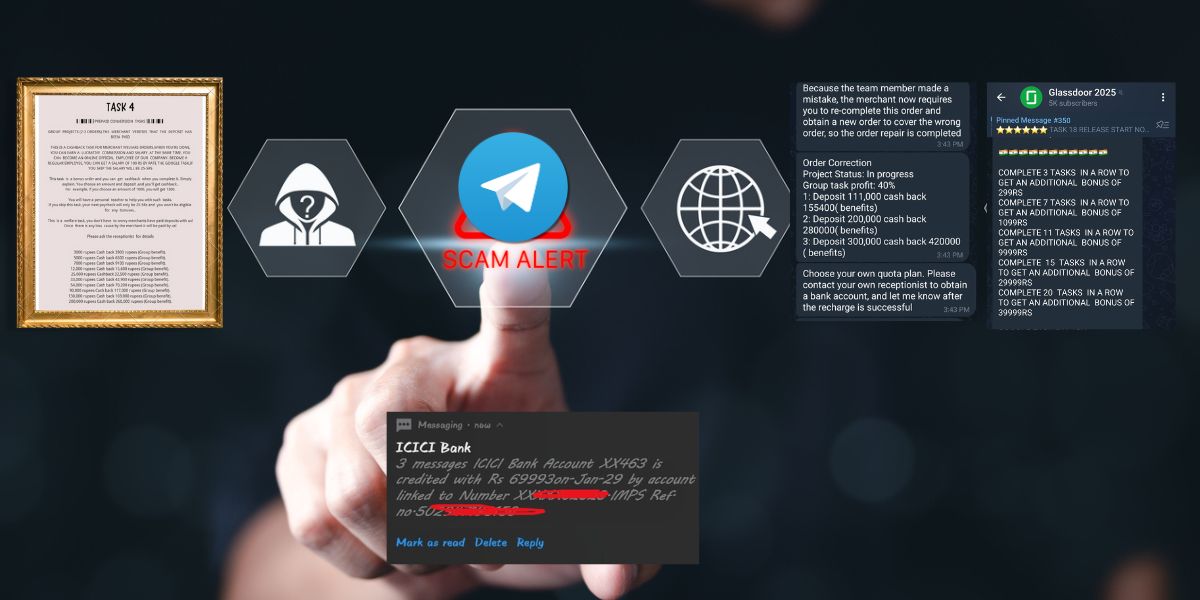Published Feb 10, 2025 | 11:00 AM ⚊ Updated Feb 13, 2025 | 9:45 AM

Telegram scam.
Synopsis: Fraudsters are exploiting Telegram Messenger’s lax compliance with Indian laws to make credulous people, who opt to make a quick buck, poorer. Bringing the cybercriminals to book is often tedious and impossible, say experts. Here’s how the conmen work:
It all began, not on Telegram, but with a WhatsApp message from an unknown number: “Are you interested in a part-time job,” the message asked.
With an expensive December behind him, Akash* decided that it would be harmless to try. All he had to do was post Google reviews for a few hundred bucks. Shady? Yes, but as he said, it didn’t seem outright fraudulent.
“No one had asked for my bank account password, an OTP, or even my Aadhaar number like the usual scams,” he said.
He had been added to a Telegram group, where he was supposed to complete 20 tasks a day. A few of them required him to invest some money into a trading account. He was skeptical, but “invested” ₹1000 and got immediate returns.
A few more tries with higher sums yielded good returns too. He was hooked. By his calculations, if he did it four days a week, he could make about ₹40,000 in a month.
Unfortunately, within two days, his new side gig became troublesome. The paid tasks, where he was carefully investing just ₹3,000–₹5,000, suddenly needed about ₹20,000 more for him to be able to withdraw the money. He managed to borrow the sum and make a profit, but the platform then demanded yet another top-up for a third task — this time for ₹30,000.
He would not be able to withdraw the ₹41,000 balance in his trading account till this task was completed. With a week left before his salary was paid from his actual job, Akash was broke and ₹20,000 in debt. He is still on the channel.
Akash, like many others before him, had fallen prey to the modern-day equivalent of a Ponzi scheme — albeit one with faster returns. Several members of the “Glassdoor” channel were tied up in an investment loop and had to keep investing more funds to get their money back. All of this on Telegram.

The channels assign pre-paid tasks to ‘investors’. (Screenshot)
Most of them, like Akash, said they had been stuck for weeks. “I am waiting for my salary so that I can invest ₹34,000 more. It’s a large amount, but the group has promised returns of about ₹72,000 from the ‘merchant’,” said Ajay*, one of the members.
The channel is not an isolated incident. Numerous threads on Reddit have echoed Akash and Ajay’s story, with people having lost up to a few crores. Cyber security experts estimate that around ₹300-400 crore might have been lost in these scams in the last year alone.
Telegram, the app famous for content channels, end-to-end encryption, and secret chat features, has also been gaining notoriety in India for part-time job scams. Users who sign up are asked to invest small amounts on mock trading platforms and are assured quick returns.
While people’s first attempts at money-making are successful, such channels inevitably disappear, leaving investors with bigger losses.
“Legally, such frauds fall under Sections 66D and 67C of the IT [Infromation Technology] Act, 2000, but tracing the culprits remains a challenge due to Telegram’s lax compliance with Indian regulations. While the government has received thousands of complaints in 2024 alone, more stringent monitoring, enforcement, and international cooperation are required to curb this menace,” said Mirza Faizan Assad, cybercrime expert and lawyer.
These sections deal with cheating by personation by using computer resources and identity theft. Users, he added, must be vigilant and avoid engaging in too-good-to-be-true offers.
While government advisories warn the public not to give out sensitive information, like bank passwords, people tend to be more susceptible to schemes like these, said Shweta, a former cybercrime victim.

Channels like Glassdoor are designed in such a way that users believe that are dealing with a legitimate entity. (Screenshot)
“The channel and related apps or websites are designed in such a way that you do feel you are trading on a legitimate exchange and making money,” she said.
The Telegram channels, like Shweta said, operate like a company. Glassdoor, for example, has a hierarchy with each level having specific functions. As you start, you are an “intern,” and you receive ₹50 for posting Google reviews and participating in a few prepaid tasks. You become a full-time “staffer,” and your salary goes up to ₹100 per task. You are eligible to receive bonuses after completing a certain number of tasks per day, and you are supposed to invite more people to the channel for incentives of up to ₹500.
People on the Telegram channel receive money and submit details of the tasks done to a “receptionist.” They also deposit money with UPI IDs which the receptionist provides. For the prepaid tasks, they are split into groups of five, and guided through the trade by a “teacher.”
The tasks are supposedly assigned by a “merchant,” who requires you to complete two or three orders — trades on a website designed like a crypto-trading platform. While you get to choose the initial amount you invest, you will have to top up that amount for the second order and see it through before you can withdraw the money.
Making a mistake in the trade leads to losing all the money, as Himashi* found out. She lost her initial investment and was asked to pay ₹60,000 extra for a “corrective task” that would give her returns of ₹1.15 lakh.
“Why would I be trading here if I had ₹60,000,” she asked. Given that the platform had no legal contract with her, she had no way of recovering her initial investment till she came up with the money for the corrective task.
“I thought it was a nice way to make a little more money. The channel kept posting screenshots of people depositing money and earning a lot. The returns did confuse me, but they said it was a crypto-trading platform! We don’t know much about how those work…we only hear that people earn a lot of money in them,” she said.
Sneha*, a “receptionist” in a former channel, said she had no idea it would be a scam when she was first approached.
“A total stranger texted me about a part-time job offer on WhatsApp. I was supposed to send out pre-written messages to people and give out codes and UPI IDs. And then one day, it all disappeared. Fortunately, they had paid me every month and I did not lose money,” she said.
Telegram was created by Pavel and Nikolai Durov in 2013. A key plus of the app — for scammers — is that, unlike WhatsApp, it does not require a verified phone number, making it easy for people to operate anonymously.
The app came under scrutiny in August last year, with cyber experts going as far as to compare it with the dark web for its alleged involvement in extortion, distributing leaked exam papers, and stock manipulation among other things.
In July, the Securities and Exchange Board of India (SEBI) discovered a channel manipulating the stock prices of a steel sheet manufacturing firm. The group admin was charged with receiving ₹20 lakh as a commission for the fraud.
“Telegram’s lax compliance with Indian laws has led to an increase in cybercrimes, including investment scams, online frauds, betting rackets, fake job schemes, and misinformation campaigns. Unlike platforms like WhatsApp, X (previously Twitter), or Facebook, Telegram does not fully adhere to India’s Information Technology (IT) laws, making enforcement difficult,” said Assad.
The app, he added, delays or denies sharing user data (IP addresses, phone numbers) when requested by Indian authorities. “The government should mandate Telegram to provide message traceability in serious cases like financial fraud and national security threats, without violating user privacy in general cases,” he said.
Ponzi schemes have been around ever since their namesake Charles Ponzi pulled off a huge one in the 1920s by making people think he was making easy money trading international reply coupons. While the format has evolved over the years, Telegram prepaid scams seem to be the latest variation.
(*Names changed. Edited by Majnu Babu).

